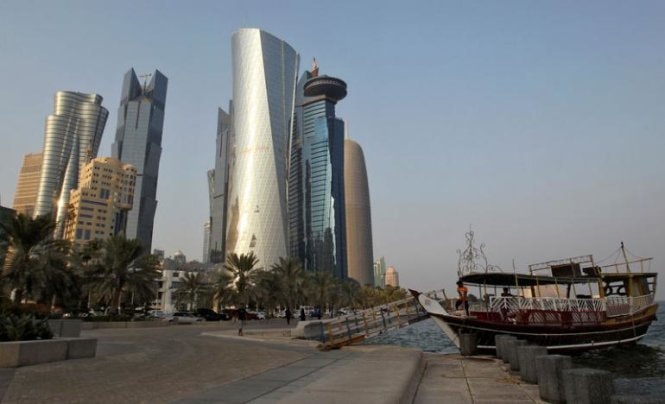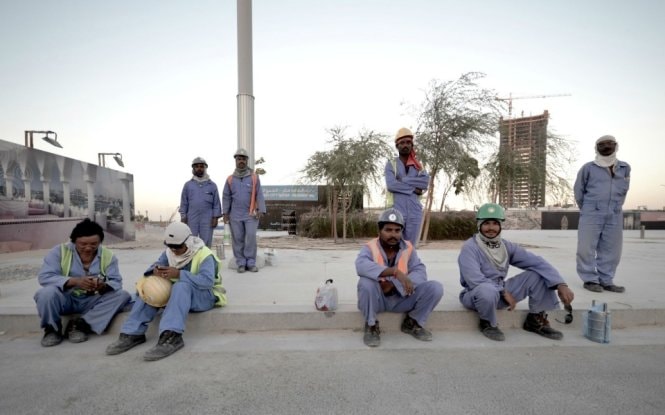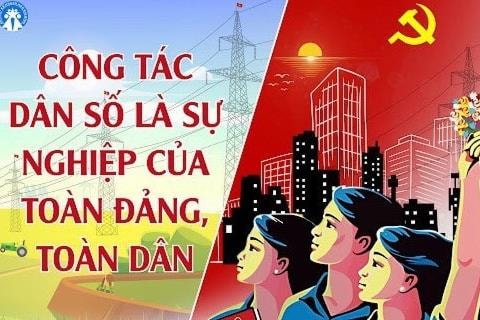Qatar - the place with the strangest population in the world
Qatar's population is not static, it's constantly changing. So fast that a census has to be conducted... every month.
 |
| Qatar's development is partly due to the contribution of immigrants. Photo: Reuters |
Located on the Arabian Peninsula, the country of Qatar with an area of over 11,000 km2 owns the world's largest oil and gas resources, is a destination for many people. There are tourists, business people, and workers, not to mention because... there are too many.
In terms of GDP per capita, Qatar is currently the country with the highest income in the world, according to the International Monetary Fund (IMF). Some people jokingly say that it is easy to be a Qatari citizen, but it is difficult to be a Qatari (in English called Qataris).
Census every... month
 |
| Immigrants in Qatar are also counted in the country's population and mainly work as construction workers. Photo: Reuters |
Anyone living in Qatar is counted as part of the country's population. There's nothing unusual about this calculation, and it's actually true to the literal meaning of population, which is "the number of people living in a given geographical area or space."
However, the strange thing here is that every month, Qatar "counts" its population because the rate of change is so fast!
What is even more strange is that the non-Qatari population has always been overwhelming in statistics, accounting for more than 80% of the population of this country. This reality has existed since Qatar gained independence from Britain in 1971 until now.
As of the end of May 2017, Qatar's total population was 2,700,539 people, compared to the previous month, Qatar's population increased by more than 25,000 people, according to the Qatar Ministry of Planning, Development and Statistics.
Since the beginning of the year, Qatar's population has increased by 124,358 people.
This is because the population of Qatar is mainly immigrants or citizens of countries in the Gulf Cooperation Council (GCC). Most of them are workers from Asian countries such as India, Nepal, and the Philippines.
The proportion of Qatari citizens, while not constant, has been stable, at around 313,000 as of early 2017, or 11.5% of the population. This is the lowest proportion since 2004, and is even less than half the number of Indian immigrants (650,000).
There is an interesting thing, whether by coincidence or by unwritten rule, the male to female ratio in Qatar is always maintained at 3 males - 1 female.
Speaking of which, if a person sets foot in Qatar and has the opportunity to live there for more than a month, they will become a Qatari citizen without knowing it.
Is it fun to be a citizen of the country with the highest income in the world? It is fun, but it is all fame and fortune because all that money is in the pockets of the Qatari bosses.
Being a Qatari is very difficult.
 |
| Former King of Qatar Hamad bin Khalifa Al Thani (center). In 2013, he abdicated the throne to his son, who is also the current King of Qatar, Tamim bin Hamad Al Thani. Photo: Reuters |
So who are the Qataris, anyway? Historical factors aside, they are now the country’s oil-rich tycoons and newly naturalized citizens.
A child born in Qatar whose father or mother is unknown is not considered a citizen of the country. However, if the father is Qatari, the child will automatically become a citizen of the country regardless of where he or she is born. This does not apply to individuals born to a Qatari mother.
So, can a normal foreigner with no relatives in Qatar become a Qatari? The answer is yes, but he/she must reside in the country for at least 25 years continuously, with no more than 6 months of interruption, and must know Arabic and have a legal job to support himself/herself. If he/she is an Arab citizen, it only takes 15 years to become a Qatari citizen.
Despite the hardships, once they become Qatari citizens, these people will be well taken care of by the government. Public sector jobs are highly paid; social benefits from health care to education, pensions and unemployment benefits are fully guaranteed. Some say the Qatari government is very generous and willing to use money to "buy" the loyalty of its citizens.
Flexible but not sustainable Qatar's government has admitted that its rapidly growing population is posing many challenges to the country, from infrastructure (low-income social housing) to cultural differences, especially economic ones. The contribution of expatriates living and working in Qatar cannot be denied. However, "if for any reason a large number of expatriates leave Qatar, not only will labor productivity decline, projects be delayed, but worse, it will create a secondary decline in the economy as their spending is lost," the Qatari government's Human Development Report 2015 said. This concern partly explains why Qatar has not expelled its GCC residents despite Saudi Arabia, Bahrain, and the United Arab Emirates cutting diplomatic ties on June 5. As of the end of 2016, there were about 2,000 Vietnamese people living and working in Qatar. |
According to Tuoi Tre
| RELATED NEWS |
|---|




.jpg)



